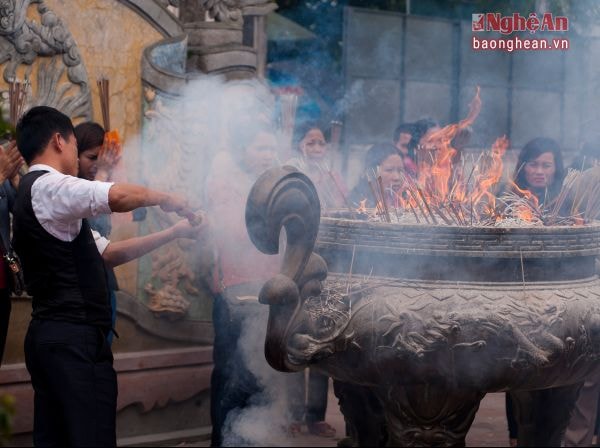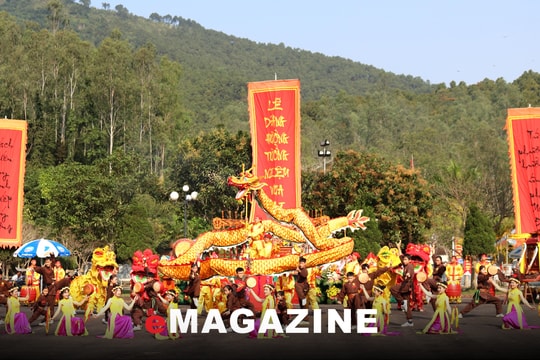Vietnamese people's psychology when going to temples: The more incense burned, the greater the merit?
(Baonghean) - It is not uncommon for people to burn incense after worshiping, placing it in the altar, and turning away, and the temple or pagoda management board hastily pulls it out, stubs it out, and throws it in the trash! Many places have to hang signs advising visitors to only burn one incense stick per person.
For thousands of years, traditional beliefs of our ancestors have almost always been associated with incense: worshiping ancestors, Buddhas, saints, ghosts and gods; death anniversaries, Tet, visiting graves, funerals...; any ceremony with spiritual elements must have incense.
Incense smoke is like a symbolic, invisible bridge between the living and the hidden powers. Imagine a traditional worship ceremony without a red-burning incense stick slowly dropping curls of ash, slowly releasing wisps of fragrant incense smoke into the air; that worship ceremony would be very "bland". Private homes are like that, temples and shrines of course cannot lack incense smoke, all four seasons...
However, good customs (in some places) are in danger of turning into bad customs when life improves, the need for spirituality skyrockets, causing the festival season in January and February to be crowded with visitors and pagodas. Of course, going to temples and pagodas cannot be without incense; and religious fervor makes most spiritual tourists never hesitate to spend money on incense. Incense stands are readily available. Both retailers outside and temple and pagoda management boards inside also sell incense to earn extra income.
 |
| Incense smoke billows in many pagodas and temples on the first days of Spring. Photo: Chu Thanh |
Many sellers want high revenue, always encouraging customers to buy a lot, burn a lot of incense to gain great merit (!?). Buyers are either gullible, or influenced by the crowd mentality; seeing everyone else buying a lot, burning a lot, they burn a little and are afraid it won't be effective.
So I bought a whole bunch. The price was of course one and a half or double what it was outside. Never mind, why bother calculating merits, it was only once in a while that I had the chance to visit the place, to ask for blessings from the gods.
As a result, many temples and pagodas during the festival season have thick smoke filling the space like… a fire. And if you are not careful, there might be a real fire. Temples and pagodas that are crowded with visitors must assign people to look after and “handle” the incense burners and bowls that are regularly “taken care of” by visitors. It is not uncommon for people to burn incense just after they have finished praying, placed it in the incense burner, and turned away, and the temple and pagoda management board hastily pulls it out, stubs it out, and throws it in the trash! Many places have to hang signs advising visitors to only burn one incense stick per person.
But many people probably don’t see it (or pretend not to see it); during the ceremony, they still burn the whole bundle to make it… “enthusiastic”. So the “rush hour” in temples and pagodas is always a dense space, filled with smoke pouring out from every worship room. Of course, whoever is late will burn it in a hurry, finish the ceremony in a hurry and then “run away”; no longer can you find the spiritual feeling sublimated by the fragrant scent of incense, lingering in the space emanating from a few incense sticks emitting smoke slowly…
Seeing the "spiritual trash cans" (full of huge, half-burned incense sticks) that the temple and pagoda management board takes out every afternoon without feeling any remorse is a strange thing. Looking far ahead, thinking a little further, the Gods and Buddhas - if they are truly divine - would never want sentient beings to do such a wasteful and environmentally polluting thing.
Thinking to myself: Is it because of greed (wanting to be taken care of by God and Buddha) that people indulge in ignorant behavior (not clear-headed) without knowing it?
Y Nguyen
| RELATED NEWS |
|---|




